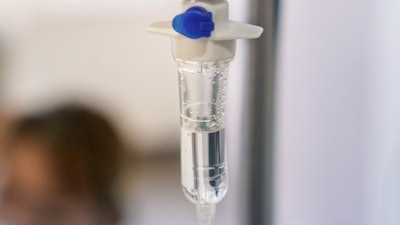
Hallucinated sexual assaults and erotic fantasies induced by sedatives, including midazolam, may occur during procedures like dental restorations, putting clinicians at risk of legal troubles, according to a review published on March 9 in the Journal of Clinical Pharmacology.
The type of procedure a patient undergoes appears to be linked to the type of sexual hallucination the person experienced, and the higher the dose of sedative, the greater the risk, according to the review. Though these serious occurrences are rare, it is critical that dentists take necessary steps to keep themselves and their patients safe, the authors wrote.
"Legal repercussions will continue to occur in future cases that involve sedative hypnotics unless procedures are in place to protect the patient and the clinician," wrote the authors, led by C. Michael White, PharmD, of the University of Connecticut School of Pharmacy in Storrs.
Sedative hypnotic medications reduce consciousness, motor control, and decision-making ability. Individuals have used these drugs to facilitate sexual assault, and though unusual, sexual assaults may occur in healthcare settings. These cases violate the trust between a patient and their healthcare professional and stigmatize clinicians.
The same drugs that have been used in facilitating sexual assault also can cause sexual hallucinations, which can be vivid and may leave a person unable to distinguish between fantasy and reality. In some scenarios, patients have accused clinicians of sexual assault.
To identify and evaluate instances of sedative hypnotic drug-induced sexual thoughts in patients and steps that healthcare professionals can take to reduce the risk to other patients and themselves, the authors reviewed 22 citations that included 87 cases of hallucinations about sexual assault or sexual fantasy, according to the review.
In multiple cases, the actual occurrence of sexual assault was unlikely due to the environment and the monitoring that existed. However, both patients and accused clinicians experienced significant anguish, the authors wrote.
In many of the cases, the places of the body where procedures were performed were associated with the area of the body where the patients perceived the sexual assault or fantasy occurred, according to the paper's authors. In 30 (34%) of the cases reported in the literature, patients' complaints and the body parts manipulated during the procedure were reported. In 27 of those 30 cases, body parts that patients thought had been touched in a sexual way were associated in some way with the procedures they underwent. For example, patients had correlated oral procedures with oral sex, the authors wrote.
Also, the larger the dose of sedative, including midazolam and propofol, administered, the greater the risk a patient would experience a sexual fantasy or hallucination. In the 87 cases, benzodiazepine midazolam was the most common drug used. It was used in 36 (41%) of the cases.
Other sedatives used included diazepam, propofol, and nitrous oxide. (Note: The accepted manuscript version of this paper refers to nitric oxide. We have changed that term to “nitrous oxide” in the article.) In some of the cases, sexual hallucinations occurred when the dose of midazolam or diazepam administered was above 0.1mg/kg and in other cases where the nitrous oxide dose was greater than 50%. In some of the literature, more than 30 mg of propofol was linked with patients having sexual hallucinations, they wrote.
Protecting patients, dental teams
First, dentists should inform patients that sexual fantasies or hallucinations, which could include feelings of sexual assault, may occur after they are given sedatives. Clinicians should discuss the ways they keep patients safe during procedures. These methods may include having other team members present during procedures or recording audio or video of the appointment, the authors wrote.
Finally, dentists should offer mental health services to patients who experience sexual hallucinations or fantasies during procedures. Even if the sexual assault event did not occur, patients may suffer psychological trauma from having hallucinated the vivid memories of the assault, they wrote.
The data had some limitations, including that the cases relied on the patient to recall the event or what they experienced following sedation for medical or dental procedures, they wrote.
"Healthcare professionals can take steps to reduce the chances of patients believing they were sexually assaulted during their procedures involving the administration of sedative hypnotics," White et al wrote.




















